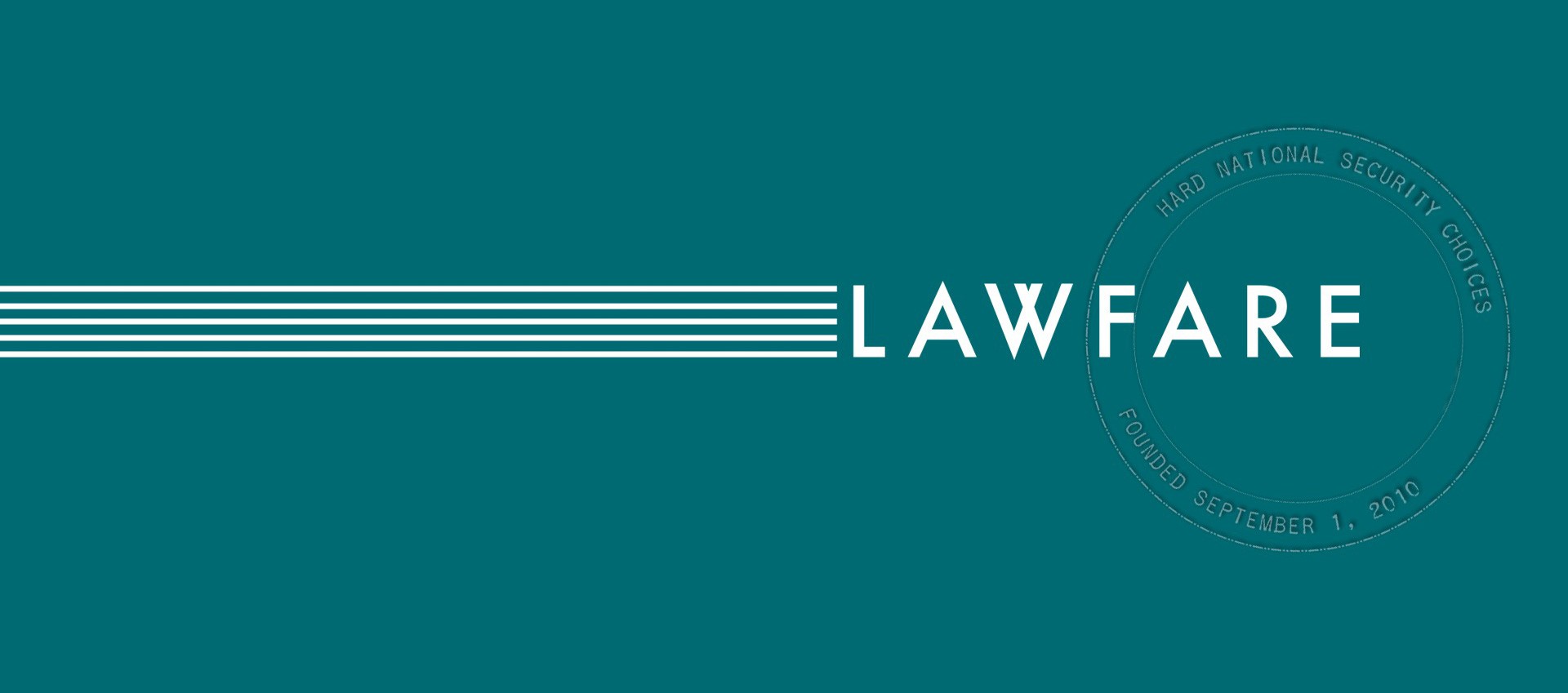The Week That Was: All of Lawfare in One Post
Your weekly summary of everything on the site.

Published by The Lawfare Institute
in Cooperation With

Quinta Jurecic and Alan Rozenshtein discussed whether presidential immunity will be applied in three civil lawsuits against former President Donald Trump for his campaign to incite the Jan. 6 insurrection.
Saraphin Dhanani evaluated an opinion from a D.C. District Court judge authorizing the use of a geofence warrant in the Jan. 6 prosecution case United States v. Rhine.
On the Lawfare Podcast, David Kris and Bryan Cunningham sat down with Kemba Walden to discuss her priorities as acting national cyber director for the Biden administration, the new U.S. National Cyber Strategy announced March 2, and cybersecurity threats posed by China.
Herb Lin identified policy changes included in the Biden administration’s new National Cybersecurity Strategy, and highlighted how the proposal advocates for more stringent regulation, to protect consumers in cyberspace, and places responsibility on vendors to ensure the security of software.
Dhanani sat down with Stephanie Pell and Eugenia Lostri on the Lawfare Podcast to discuss the Biden administration’s new National Cybersecurity Strategy.
Gary Corn and Melanie Teplinsky shared a new whitepaper from the American University Washington College of Law’s Technology, Law, and Security Program, outlining recommendations for combating evolving ransomware threats in line with the Biden administration’s new National Cybersecurity Strategy.
On an installment of Arbiters of Truth on the Lawfare Podcast, Jurecic and Rozenshtein sat down with Matt Perault and Jess Miers to debate whether language models like ChatGPT’s output should be considered third-party content, whether companies like OpenAI should enjoy immunity for the content they produce, and why plaintiffs might want to sue chatbots in the first place.
Jeff Kosseff identified instances in which state legislators in Florida, Utah, and Texas have pursued legislation to reduce anonymity online. Kosseff considered the damage such a proposal might inflict, if codified, in spite of potential first amendment challenges.
On this week’s episode of Rational Security, Scott R. Anderson, Jurecic, and Rozenshtein were joined by Kosseff to discuss the week’s big national security news stories, including new legislation in Florida requiring some internet users to disclose their identity to the state, the Biden administration’s new national cybersecurity strategy, the House select committee on China’s first hearing, and more.
Stewart Baker argued that the FBI’s reliance on press reporting in support of FISA surveillance applications during a period of press overreach on Trump-Russia issues contributed to a credibility problem for the Bureau. Baker also considered possible changes that could assuage these concerns amidst this year’s debate over FISA Section 702 re-authorization.
Alistair Simmons analyzed the ongoing legal battle over the the Bureau of Alcohol, Tobacco, and Firearms’ 2018 decision to reclassify bump stocks as illegal machineguns and outlined the arguments likely to be heard when the Supreme Court ultimately weighs in on the issue.
Justin Sherman discussed the limitations of the Health Insurance Portability and Accountability Act, exemplified by the Federal Trade Commission’s enforcement action against telehealth company GoodRx, and the imperative for a congressional mandate to more comprehensively protect health data.
On an episode of the Lawfare Podcast, Benjamin Wittes sat down with Amichai Cohen and Yuval Shany, co-authors of a six-part series on Israeli judicial reforms in Lawfare, to contextualize the ongoing protests in Israel and discuss possible outcomes.
Anunay Kulshrestha and Gurshabad Grover analyzed India’s newly proposed Indian Telecommunication Bill, the first update in 90 years to a set of colonial-era laws still governing India’s telecom industry and internet. Kulshrestha and Grover argue the draft bill continues to rely on obsolete legal definitions and seriously endangers Indians’ security and human rights.
Tyler McBrien sat down with Philippe Sands to discuss colonialism in the Indo-Pacific, efforts to restore the homeland of the Chagossian people, and the role of identity in crafting international law.
In the latest installment of Lawfare’s foreign policy essay series, Kai Thaler forecasted how the release of 222 political prisoners to the United States will affect political repression in Nicaragua, led by President Daniel Ortega and Vice President and First Lady Rosario Murillo.
Naman Karl-Thomas Habtom considered the implications of designating the Wagner Group as a Foreign Terrorist Organization (FTO) for Africa, where the mercenary group has been active in a number of counter-insurgency and counter-terrorism operations at the invitation of states that have security relationships with Russia.
Patrick Hulme analyzed the prevalence of presidential imperialism—manifested by unauthorized uses of force in global conflicts—and discussed the historical evidence that reflects congressional restraint on executive military action.
Avery Schmitz shared a livestream in which the Senate Select Committee on Intelligence weighed worldwide threats to U.S. security, informed by testimony from key intelligence officials.
And on an episode of Chatter, David Priess sat down with Mark Hertling, who was recently appointed by President Biden as Chairman of the American Battle Monuments Commission. Priess and Hertling discussed Hertling’s experience at West Point, leadership and training during and after his time in the Army, the origins and missions of the Commission, and more.
And that was the week that was.


